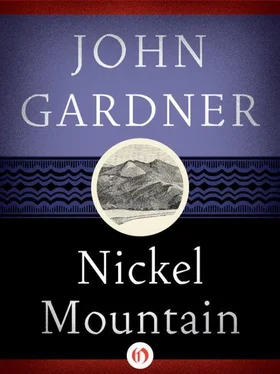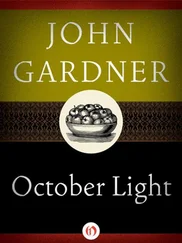Henry shook his head, smiling (but he felt frustrated, cross. There were things that weren’t getting said. He wanted to make them shut up and think a minute, talk sense). He rang up the truckers’ checks.
“Henry,” George shouted over to him, “I ask you man to man if it’s not a fact that there isn’t any devil and there isn’t any God, and even if there is, a man who doesn’t believe in God lives a better life than a man who does. Now I want you to tell me the truth.” Henry started to answer, but George said: “A man that thinks he’s righteous is deadly, you know it. He takes credit for things he’s got nothing to do with — accidents like his living where he happens to live and knowing exactly the people he knows. He thinks he’s Jesus H. Christ and it makes him arrogant.”
But the family in the booth was ready now. “Some other time,” Henry said. He went over to the family in the booth.
The man said, “I guess I’ll try that beef sandwich, Slim.”
Henry got out his checkpad.
By the time Henry had their orders ready, more people had come. It was the busy time, and he saw there was no hope now of his getting back to the argument. Callie and Jimmy had finished eating, and Callie left Jimmy sitting in the corner with a couple of toy trucks while she and her mother helped Henry keep up. George and Simon, the next time Henry got back to them, were gulping down food, still arguing — or rather, George still arguing, Simon still sitting tense and silent for long stretches, then suddenly breaking in angrily with some long quotation from the Bible. Then Doc Cathey was there, standing with his hands in his suitcoat pockets and his glasses down his nose, picking his teeth with his tongue and looking mad as the devil. He said, “You sound like a Commie, George.” “Damn right I do,” George said. “Fine, that’s the spirit,” Doc Cathey said. “You turn over half your farm to Simon Bale and I’ll believe you. But till then I’ll tell you right out it’s nothing but lies.” They were shouting, all three of them now, Simon saying, “Woe unto them that call evil good and good evil.” But nobody especially noticed the shouting. The diner was full now — four truckers laughing loudly about a story of another trucker in Pennsylvania who’d fixed a cop that was tailing him too close, Jim Millet telling about a fellow he’d fixed a tire for last night on 99, Nick Blue and Walt Forrest’s hired man talking about the new houses going up this side of New Carthage, two men in business suits, salesmen maybe, talking about how some Chevy place gave away free flowers every time a lady bought a new Corvette. It was a time of day Henry normally liked, the supper hour when the whole room began to hum and the walls when you put your fingertips on them shivered like the top of the piano when somebody was playing it. He would sink down into that bustle the way he would sink down into warm river water, and he would be sorry for people who weren’t caught up, as he was, in the buzzing, blooming confusion. But tonight he was eager for the time to be over. There were a hundred things he wanted to say, and every few minutes he would glance over where George and Simon and Doc Cathey were, to see if they were still there. (Doc Cathey was saying: “All Reds are liars. That’s not a matter of opinion, it’s a matter of fact. You take a man that’s spent years breeding coonhounds. You tell that man he’s got to pass his hounds around among people that don’t know a hound from a cow, and that man will cave your head in, and rightly so.”)
Callie said, “Henry, why don’t you break them up?”
“How can I?” Henry said.
She said, “They’re bothering the others. I mean it. They’re yelling like a bunch of drunkards.”
But then Callie’s mother came and told him the dishwasher had quit, and he had to hand over his counter checks to Callie and go fix it. It was the usual trouble, the belt underneath, and as usual it took him half an hour to get it fixed. When he got back, Doc Cathey was gone. Most of the others were gone, too; there were only six people left, four of them people who’d been there before he went in to the dishwasher, two of them truckers who’d just come in. George was saying, letting smoke out with the words, “I can’t talk to you. You’re cracked.” Simon sat with his shoulders pulled in like a man wrapped tightly in rope, his fists under his chin. It was dusk outside, almost dark. George got up and paid his check, and Henry walked over to the door with him.
George said, “What in hell did you bring him here for? Boy, I just can’t make you out.”
“He didn’t have anywheres to go,” Henry said.
“Crap.” He pushed open the screen a crack and spat. “You bring home every rattler you find in the weeds?”
“I don’t shoot at everything that moves on the theory it might be a rattler.”
George Loomis looked out at the road. “I guess that makes you Jesus, don’t it.”
“Oh, for Christ’s sake, George,” Henry said.
George nodded, then shook his head.
“Don’t go away mad, George,” Henry said. He gave a little laugh.
“Let me ask you just one thing,” he said. “Does it make you feel righteous, taking him in out of the cold like that?”
“I don’t know.”
“The hell you don’t.”
Henry held fire a second, then he let go. “It’s a question nobody in his right mind would bother to answer,” he said. “You, now, you can feel righteous all right, but anybody else it’s a dirty word. If I feel righteous for taking him in I’m a bastard, and if I don’t I’m a fool, because there’s no reason for taking him in except to give myself the thrill of righteousness, according to you.”
George said, smiling but hissing it at him, “And why did you take him in?”
“Get out,” Henry said. “I mean it. Get out of here.”
George put his hat on.
“He’s the devil,” Simon Bale said, right at Henry’s elbow. “The devil is in him.” Bale’s eyes were fire. Henry looked furiously past him. “May the devil have no power in this house,” Simon said. He was in deadly earnest.
Henry said, “Damn you, Simon, shut up before—”
“You tell ’im, Lord,” George said. He left.
Henry Soames was less and less sure, as the days passed, why it was he’d taken on the role of friend and protector to Simon Bale. His mother-in-law appeared day after day, saying nothing, butting in on his affairs and condemning him for his own mismanagement only by her presence. Because of the way he’d let the thing drag on, Callie scarcely spoke to him now from morning to night. Once when Doc Cathey came in and made some stupid remark (Henry could no longer remember it) and Henry had blown up at him, Callie had said with quiet rage, “Are you satisfied? Henry, when are you going to have had enough?” On Sunday morning, the second week of his stay, Simon Bale went out on his calls, and Henry was so angry he felt sick — angry at something he couldn’t even name: not the people who would be thinking, He comes from Henry’s place, glides down from his cool tranquility to our poor ordinary mortal domain where you earn your keep by the sweat of your fucking brow; not angry at Simon, exactly, either, whose materialization on some country porch carried, inevitably, the sanction Henry had never given and whose preaching was, insidiously, the word from Henry Soames; not angry, even, at himself, because what he had done was beyond stupidity or wisdom, it was what it was, pure and simple, old clothes on a clothesline, neither bad nor good, merely there, the inevitable and inexorable law of Henry’s constitution. Seeing Simon slumped down again, accused and no more able to answer than a fat, stupid sheep could answer his butcher, Henry would do it all again, this time knowing even as he did it the complete absurdity of what he did; and seeing the woman’s blistered, naked body in the morgue, in the gloom and the inexhaustible stench of the hospital’s bowels, he’d react to even that as he’d done before, would raise her up at his own incredibly excessive expense, and would feel the same useless irrelevant remorse at having done what it was impossible for him not to do, and, as before, he’d no doubt by the very necessity of his nature keep the thing as secret as he could, revealing it only in the form of cryptic red entries in his books.
Читать дальше











